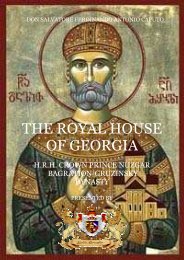here - Nobility Associations
here - Nobility Associations
here - Nobility Associations
Create successful ePaper yourself
Turn your PDF publications into a flip-book with our unique Google optimized e-Paper software.
efuse him aid--a circumstance that condemned the crusade to eventual failure as a<br />
military expedition. Everyw<strong>here</strong> he met a sullen reception, and practically every<br />
noble declined to participate in any campaign led by an excommunicate. Under<br />
those circumstances Friedrich was drawn even closer to the Teutonic Order than<br />
would have been the case. Because that Order remained loyal and assisted him in<br />
every way, he gave the members special consideration in Jerusalem after that city<br />
was recovered in the peace treaty, and he gave them the toll receipts from Acre. As<br />
long as he remained in the Holy Land with his army, he could do much as he<br />
pleased, but he could not remain t<strong>here</strong> long. Grandmaster Hermann, realizing this,<br />
avoided antagonizing the local nobles or the other crusading orders. In that way he<br />
saved his Order from the reprisals that followed when Friedrich II left Acre in l229<br />
under a shower of rotten fruit and vegetables; and he arranged for a speedy<br />
removal of the excommunication which had been placed on the Order for its<br />
support of Friedrich's crusade. Still, all was not well in the Holy Land: w<strong>here</strong>ver the<br />
imperial garrisons were small or isolated, they were attacked by the Christian<br />
nobles and prelates who were angry about Friedrich’s failure to help them in the<br />
past, about his policies in Sicily, about his quarrel with the Pope, and who<br />
considered him nothing more than an atheistic fortune-hunter.<br />
Hermann von Salza accompanied the unfortunate Emperor back to Italy and<br />
helped to reconcile him with Pope Gregory. He had given up all hope of<br />
establishing his Order permanently and solely in the Holy Land. Quickly he sent off<br />
the first contingent of knights to Prussia. His estimate of the situation in the Holy<br />
Land was correct. By l23l most of the imperial garrisons were expelled, and it was<br />
only a matter of time until Jerusalem was recaptured by the Moslems. The city fell<br />
in l244, and the Holy Land stood on the defensive, awaiting the inevitable attack<br />
that would deprive the Christians of their last footholds t<strong>here</strong>.<br />
The Teutonic Knights did not give up their interest in the Mediterranean--far from<br />
it. Their knights were more necessary for providing a garrison for Acre than ever<br />
before. But Acre was a port city, hot, humid and crowded, not a suitable place to<br />
live year in and year out. Knights flourished in the countryside, w<strong>here</strong> the climate<br />
was healthier and t<strong>here</strong> were opportunities to ride and to hunt, and fields and<br />
fodder for the horses; but also, they needed a dependable supply of locally-grown<br />
food and wine. In l220 they had purchased a run-down castle from the Hindenburg<br />
family, and now they began to repair it, using the tolls from Acre to finance the<br />
work. They named the huge fortress Montfort, probably deriving both the name<br />
and the architecture from a castle in Transylvania. In German it was called<br />
Starkenberg (Strong Mountain), and, indeed, it was sited on a most difficult<br />
location to assault. However, it was not a formidable defensive post, and was<br />
probably more noted for its handsome guest house and remarkable view over the<br />
wooded hills on one side and the Acre plain on the other than for its contributions<br />
The Hohenstaufen Dynasty - Page 104 of 200



